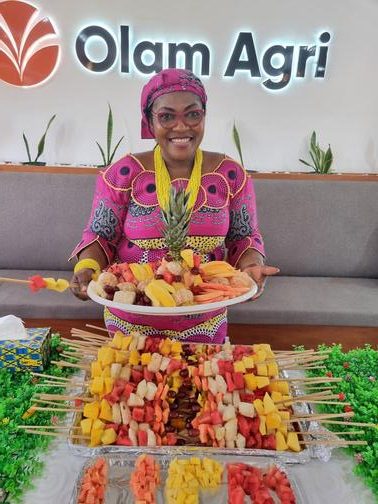
Peer learning is one of the key benefits of the Workforce Nutrition Alliance (WNA) Masterclass programme1. Each cohort brings together professionals from a range of businesses and a variety of countries and continents, creating a platform where ideas and challenges related to workforce nutrition can be shared.
We were delighted when Wilhemina Borketey, Human Resources Manager at Olam Agri Ghana Limited, signed up to join the third cohort of the WNA Masterclass programme in March 2023. She not only contributed to the high energy of the group, but also generously shared her experiences with workforce wellness initiatives as she implemented and refined many of her existing plans during the course of the Masterclass. We caught up with her to find out more about her workforce nutrition journey.
Why did the organization decide to join the WNA Masterclass?
We wanted to leverage key learnings to support our organization’s agenda of ensuring that 100% of our total workforce gains access to nutrition programs by 2030. The WNA programme pillars, namely access to nutritious and safe food in the workplace; nutrition education; regular health checks that include nutrition and/or follow-up counseling; and workplace modifications to support employees to breastfeed were aligned with these goals.
Can you tell us more about your programme?
So far, we have been able to do the following to fortify our organisation workforce nutrition efforts:
- Form a Workforce Nutrition Champions (WFN) group, consisting of representatives from each business location, to brainstorm and develop programs that support business priorities.
- Launch our Workforce Nutrition campaign at the worksite to create awareness and stimulate employee interest.
- Celebrated World Nutrition Day (on 28 May), with a health webinar featuring a registered and licensed dietician on the topic: Eat Right – Fueling a healthy life, one bite at a time.”
- Sustained the use of fortified rice at the staff canteen.
- Revised the menu for the staff canteen to include more vegetables and fewer carbohydrates, salt, and fat.
- Continued to provide free fruit to employees once every day.
- Implementation of ongoing nutrition education campaigns.
In addition to these initiatives, we have also received tremendous support from our leadership, resulting in significant improvements. These include:
- Refurbishing our staff canteen.
- Providing a daily free meal to colleagues across all locations in Ghana.
- Establishing a private lactation room, which offers a safe and convenient place for new mothers to express milk and focus on their work duties.
- Providing breast pumps and cooler sets for new mothers to express and store milk safely for their babies’ use.
The organization has also actively collected feedback from the on-site clinic to identify recurring health-related issues. This information has been instrumental in planning and implementing tailored solutions, including:
- Health talks during toolbox meetings on various health topics.
- Health education through webinars, newsletters, and flyers.
- Referrals for specialist consultations and counseling.
- Health walks.
- Specialized dietary plans.
Congratulations! What do you attribute to your success?
We made a strong case for our programme, which included explaining the benefits of providing healthy meals to staff, i.e. improved health and well-being; increased productivity and its positive impact on the bottom line; punctuality and reliability in the workplace; and prevention of chronic diseases associated with poor diets, such as heart disease, hypertension, diabetes, etc.

We also highlighted the potential effects of not providing healthy meals, such as increased health and medical expenses; higher absenteeism due to illness or frequent health facility visits; reduced workforce productivity due to ill health; and decreased energy levels and enthusiasm for work.
This, supported with data from our in-house clinic and biometric attendance records, was instrumental in our success in mobilizing internal funds for workforce nutrition.
What were some of the key challenges you came across while implementing your programme, and how did you go about overcoming them?
The major challenge we encountered was behavioral change, as many colleagues were accustomed to specific menu options. Overcoming this challenge takes time and is ongoing.
Previously, budget constraints affected colleagues at other locations, but this issue was addressed through consistent engagement by the Workforce Nutrition Champions with senior management.
The team, mindful of the challenges involved in executing programs without prior budget allocation, held brainstorming sessions to discuss and agree on the best approach to secure funding. This process included identifying opportunities to make a compelling business case for success.
You already had plans to improve workforce nutrition in your organization. To what extent did the Masterclass support his?
While our organization had pre-existing plans, the Masterclass significantly supported our efforts. It provided a structured framework for our program, offered additional tools and resources, and boosted our confidence in implementing our planned initiatives. As someone dedicated to employee health and well-being, I was thrilled to be part of this program, which allowed me to contribute meaningfully to our initiatives.
What recommendations would give to other organizations planning to start a workforce nutrition programme?
The WNA Masterclass has been instrumental in enhancing our workforce nutrition program. It equipped me with invaluable opportunities for nutrition education, sharing of ideas and experiences from other countries, and one-on-one coaching sessions, among others. These resources and experiences greatly supported our existing plans and added significant value to our initiatives.
The presentations on Nutrition 101, budgeting, tools and resources, and the invaluable one-on-one coaching sessions have been particularly beneficial in implementing world-class workforce nutrition programs that support business growth and profitability.
More about Olam Agri Ghana Limited – Grains Business
Olam Agri Ghana Limited, Grains business, is one of the leading manufacturers of fortified flours in West Africa. Established in 2012, it produces different types of wheat flour for various baking purposes. The business is a significant part of Olam Agri’s global agenda, aiming to transform food, feed, and fiber in high-growth emerging markets while focusing on cultivating and sustaining a food-secure future. Currently, they are the largest supplier of flour to major countries within the sub-region, including Ghana and Niger, and the second-largest flour brand in Burkina Faso.
References
[1] The Workforce Nutrition Masterclass is a collaborative initiative of the Global Alliance for Improved Nutrition (GAIN) and The Consumer Goods Forum (CGF). It is designed to support organisations with the planning, development and implementation of workforce nutrition programmes. The curriculum covers Breastfeeding at Work, Healthy food at Work, Nutrition Education and Nutrition-focused Health Checks, in addition to guiding participants in the practical application of such initiatives. During the Masterclass, participants receive various tools and resources to enhance the live virtual training sessions, delivered over 12 weeks. Enquire or book your spot today.
